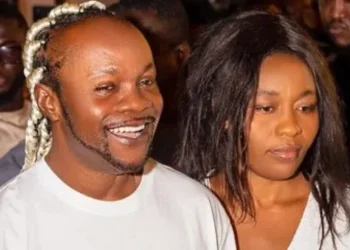West Africa is a hotbed of musical creativity. From Ghana’s Highlife and Hiplife traditions to Nigeria’s Afrobeat and contemporary Afrobeats, the region routinely produces singers, songwriters, rappers, and producers whose music travels far beyond national borders.
It is entirely fair to argue — as many observers and fans do — that Ghana often fields exceptional raw talent, in some cases surpassing individual Nigerian artists.
Yet when fans look at which country’s popular music has penetrated global playlists, mainstream radio, award ceremonies, and international collaborations most consistently, Nigeria stands out.
This advantage is less about an absence of Ghanaian ability and more about how Nigeria has packaged authenticity, innovation in production, industry scale, and global strategy into a transnational sound.
Veteran Ghanaian musician Okyeame Kwame has offered a sobering analysis of the current state of the Ghanaian music industry compared to its Nigerian counterpart.
The celebrated rapper asserted that while Ghana boasts exceptional musical talent, even more so than Nigeria in some cases, it is Nigeria’s authenticity and creative approach to production that gives it a global edge.
“We have talents than the Nigerians, but they are more authentic and do interesting productions. That’s why they are ahead.”
Okyeame Kwame
Okyeame Kwame, who has been an influential figure in the Ghanaian music scene for over two decades, emphasized that Nigeria’s dominance in Africa’s entertainment space is not necessarily due to superior talent.
Instead, he attributed it to the intentionality behind Nigerian music, from storytelling and cultural pride to sound engineering and global marketing strategies.

The Rap Doctor also noted that Nigerian producers are more experimental and unafraid to break conventional boundaries, making their songs more engaging and sonically rich.
Ghana, on the other hand, he suggested, is filled with raw talent that often fails to reach its full potential because of a tendency to copy trends or a lack of investment in innovative production.
Both countries boast deep musical lineages. Ghana’s Highlife and Hiplife cultivated sophisticated melodies, storytelling rap flows, and hybrid genres that produced celebrated acts and enduring musical structures.
Artists like E.T. Mensah, Ebo Taylor, and contemporary stars such as Sarkodie, Stonebwoy, Shatta Wale, and Amaarae draw on that heritage, giving Ghana a signature musical identity that is both local and cosmopolitan.
Nigeria’s modern dominance builds on a similarly rich past — from Fela Kuti’s Afrobeat to the pop and hip‑hop-influenced sounds of the 1990s and 2000s.
The Nigerian industry has spent decades refining a sound and an ecosystem that blends local rhythms, pidgin, and regional languages with accessible hooks and contemporary production techniques.
Over the last decade, this blend crystallized into what global audiences now call Afrobeats (distinct from Fela’s Afrobeat), a genre that has become synonymous with contemporary West African pop worldwide.
“Authenticity” in music is a contested term. Still, one useful way to understand it here is the ability of an artist or scene to communicate cultural specificity while remaining accessible and emotionally resonant to outsiders.
Nigerian artists have often been very skillful at this balancing act. Their songs frequently fuse identifiable local markers — street slang, cadence of pidgin English, familiar rhythmic patterns — with universal lyrical themes (love, hustle, celebration) and highly memorable choruses.
This combination feels genuine to domestic audiences and relatable to international listeners, which encourages cross-border adoption rather than mere exoticization.
Ghana’s Strengths, Structural Constraints

This is not to diminish Ghana. Ghanaian artists often display exceptional vocal ability, lyricism, and experimentalism in rap, alternative pop, and Afro-fusion.
Recent years have seen Ghanaian acts like Amaarae, Black Sherif, and others capture international critical attention and build devoted diasporic followings. Ghana’s musical aesthetics — understated, soulful, rhythmically complex — offer rich alternative approaches to global listeners tired of homogenized pop.
However, Ghana’s industry is comparatively smaller, more fragmented, and less able to consistently scale artists to global audiences. Marketing budgets, label reach, and the density of in-country production networks have not historically matched Nigeria’s.
Even when Ghanaian songs are artistically exceptional, they sometimes lack the production framing, cross-market collaborations, or viral momentum that catalyze sustained global penetration.
It is important to avoid binary thinking: Ghanaian music is not inherently “inferior” to Nigerian music.
Rather, the distinction is structural and strategic. Nigeria’s global edge is the product of cumulative advantages — a vast and competitive music economy, producers with a knack for marrying authenticity with pop polish, and an industry culture oriented toward cross-border scale.
Ghana is catching up in important ways: more Ghanaian artists are collaborating internationally, experimenting boldly with production, and leveraging digital platforms to reach worldwide audiences.
Ghana’s musical talent is abundant and often underappreciated; its artists bring vital creativity and depth to West African music.
Still, when the criterion is sustained global reach and mainstream international influence, Nigeria’s authenticity-as-practice and highly creative production workflows have, to date, produced a clearer and more durable edge.
That edge is not fixed: as Ghanaian producers and labels professionalize and as global listeners continue to crave diverse, authentic voices, the balance will keep shifting — to the benefit of both countries and, more importantly, to the world audience that gets to enjoy a richer palette of West African sound.
READ ALSO: Civilian-Led Helicopter Crash Investigation Gains Support























